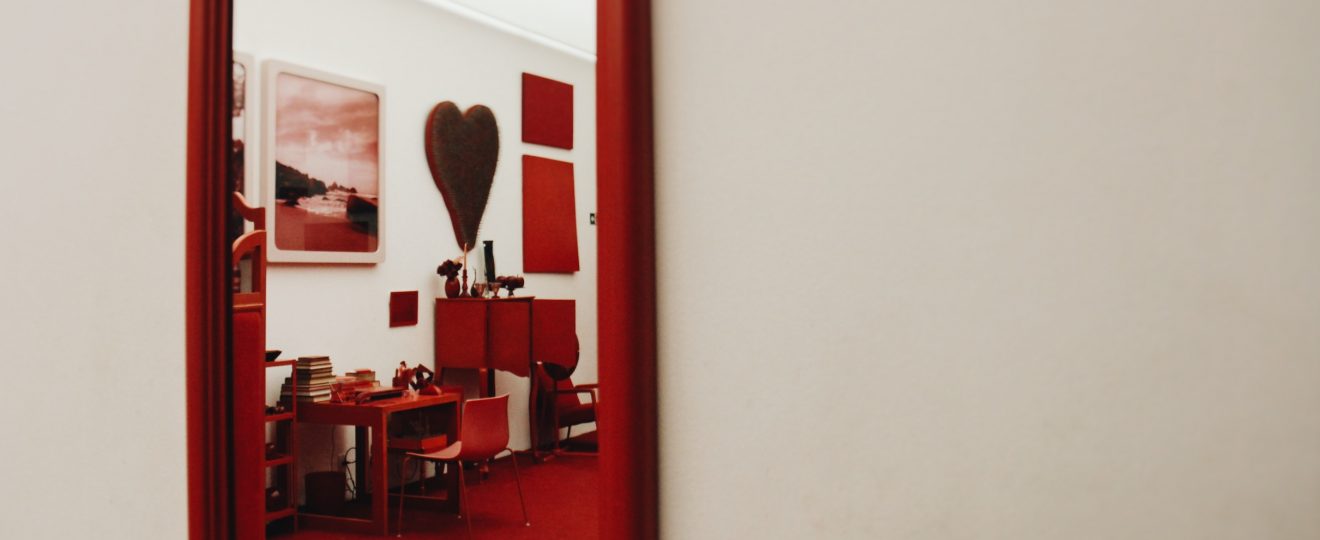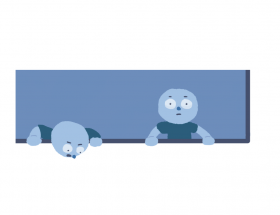
Greek mythology, as I superficially see it, is the precursor to soap operas, reality television, and grocery store erotica novels. It is tightly packed with gossip, drama, love, hate, tragedy, sex, scandal. So, during the Second Order of the Ancient World, when Gaia – Greek primordial deity and Titan mother – asked her son Kronos to kill his father Ouranos, Kronos did what any character wrapped up in a shamelessly enthralling plotline would do.
He happily obliged.
Gaia (the earth mother) and Ouranos (the sky father) used to have a fine marriage. It was a little cursed to begin with, I suppose, considering Ouranos was actually Gaia’s son. But things just seemed to happen back then, and together, they conceived the cosmic red carpet that started this whole mess (history, you know?); they are the reason we crawl this linear path of chronological cloth that is still unfurling to this day.
After that abstract birth of a metaphysical notion, they then had a lot of actual kids. Most notably, they had twelve titans (of which Kronos is one). Less notably, they had two sets of triplets. The first set were the Cyclopes, named Brontes (thunder), Steropes (lightning), and Arges (brightness). Ouranos, being the sky and all, naturally enjoyed the presence of these children. They all worked together quite well, on occasion. The second set of triplets, however, proved to be far more controversial. These were the Hecatonchires. There was Cottus (the furious), Gyges (the long-limbed), and Aegaeon (the sea-goat). They all had fifty heads and a hundred hands.
(I’m giving a quick interjection here to say that personally, I think the mere idea of the Hecatonchires is everything I have ever wanted from mythology, and would go so far as to declare them as the ideal beauty standard of today’s world. Fifty heads? One hundred hands? Sign me up. Personally I resonate with the sea-goat descriptor as well.)
Gaia loved all her children, but Ouranos was being kind of, like, lame? He decided they were too ugly, and so he forced them back into Gaia’s womb. Classic marriage-on-the-rocks stuff. Gaia didn’t take this too well, and decided she was done with Ouranos and his attitude and wanted him dead.
Enter: Kronos.
Kronos was, from what I understand, a bit brooding, with a flair for the dramatic. It was these traits that meant that instead of simply striking his father with a large scythe as originally planned, he decided to approach Ouranos mid-coitus with Gaia, and castrate him. Which he did. And in a show of masculine bravado and patricidal glory, he flung his fathers blood-and-semen covered member across all of Greece.
You will simply not believe how this story connects to the rest of this article.
At the end of it’s aerial tour of the Balkans, Ouranos’ severed genitals landed in the ocean. And from its landing site, seawater and seminal fluid swirled and twisted until the ocean frothed into a pearly champagne foam that bubbled and spit until suddenly it birthed the most breathtaking and beguiling beauty yet to exist: Aphrodite (her name can be translated back to from the foam). Yes, this is what happened moments before the scene depicted in Boticelli’s infamous painting.
Aphrodite, having walked lightly upon seafoam and spindrift, took her first earthbound step on the island of Cyprus, thus making it sacred to her from then on.

It’s 2am.
It’s 2am and I am seventeen and I am shocked because it’s 2am.
I could have sworn I checked my phone an hour ago. Didn’t it say 10pm? Wasn’t it only 10pm?
I look down at my watch one more time. My mouth hangs open.
It is definitely 2am.
Now I’m only four hours away from waking up. Soon, I’ll be languishing in the sting of a morning alarm. Soon, I’ll be driving along a navy road through the sandpaper Northern California sunrise with my sister. Soon. So soon.
I guess some part of me knew. That’s why I was starting to see blurry. My eyes always get watery and bloodshot when I am tired.
I curve my parentheses spine back to some semblance of straight and crack my neck. My throat is sleepy, vocal chords eroded from a vibrato landslide. I am covered in cords and cables. They crawled up me as time progressed, entangling limbs and engulfing elbows, rooting me to my window seat, mooring me to the lullaby lilt of my piano. I am a castle wall and it is only when I look down at my ivy-ravaged stone that I realise how long I have been standing here. That I realise I am now ruins and that the royalty I once accommodated has drained from me as time passed.
Nothing feels better than this. Nothing can feel better than this.
I’m cleaning up. Wrapping cables. Putting microphones back into their boxes.
This exhaustion is so pure, so earned. It is not weariness – that doughy and listless residue that sweeps itself into the cracks of your consciousness even after you have rested. No. It isn’t debilitation either. Not a thankless emptiness that follows the beration of all well-preserved energy.
It is, instead, a wholesome fatigue. A sleepiness that follows the frenzied burst of creation, like poking a blister and watching it drain.
I have done something I love for hours on end. I have done it not because I wanted to, but because I simply had to. Because it was intolerable not to. Because it consumed me and puppeteered me.
It has left now. I can crawl into my bed. I will sleep soundly for the four hours I have.
It is 2am.

Fast forward now to some point in the Silver Age of Ancient Greece. We’re still on the island of Cyprus, but we’re now focused on a man named Pygmalion. Pygmalion was a sculptor from the port town of Amathus. By all accounts, he was a sensitive man – artistic, devoted mainly to his clay and chisels and rasps, and an admirer of love.
Not any love. True love, deep love, real love; the type of love that almost always ended poorly in Grecian myths. To Pygmalion, love was sacred. It was reserved for an enamored heart bursting like a Cupid-struck water balloon. It was not frivolous or half-inflated.
Cyprus at this time, being the island of Aphrodite and all, was getting a reputation for being a bit sexually uninhibited and indulgent, and was seen by many of the Greek mainlanders the same way many tourists see Amsterdam’s Red Light District. It was debauched to some, enticing to others, and a taboo concoction of both to most.
Pygmalion had grown tired of the unbridled affairs of the island, and decided to swear off love and sex eternally. He would instead work only on his one true love: his art.
Aphrodite grew offended by this. An attractive and talented eligible bachelor? Swearing himself to celibacy? Impossible. Offensive, even! It was her island of love and she would disrespect people’s boundaries if she wanted to. So it happened that one day, looking down on Pygmalion as he worked tirelessly on a new sculpture of a military general, Aphrodite decided to stir up a bit of trouble.

My friend Genevieve – who inspires everything I do, think, and write – once talked to me in great detail about Elizabeth Gilbert’s Ted Talk on creativity. Elizabeth Gilbert, if you don’t know, is the author of Eat, Pray, Love, and while I didn’t have much of an opinion on her, after watching her Ted Talk, I became a bit obsessed (my true fans will note that I cited a Ted Talk in my last article too. What can I say? Big fan of the whole human-speaking-on-the-human-condition thing. It’s kind of cool).
Gilbert’s talk is posed originally as a way to condemn the perpetuated belief that all creatives must be ‘tortured’ or ‘troubled’; she pulls the fancified curtain down to expose the contemptible notion that art is and should be some process of starvation. A potential way to fix this, she proposes, is to move away from our Enlightenment-influenced idea that “this or that artist” is a genius, and instead accept the culturally distinct thought that perhaps people have a genius.
What struck me most about Gilbert’s suggestion was an example she gave in relation to American poet Ruth Stone, an incredible writer from Roanoke Virginia (please read her poem The Pear, I adore it):
“[Stone] would be out working in the fields, and she said she would feel and hear a poem coming at her from over the landscape. And she said it was like a thunderous train of air. And it would come barreling down at her over the landscape. And she felt it coming, because it would shake the earth under her feet. She knew that she had only one thing to do at that point, and that was to, in her words, “run like hell.” And she would run like hell to the house and she would be getting chased by this poem, and the whole deal was that she had to get to a piece of paper and a pencil fast enough so that when it thundered through her, she could collect it and grab it on the page. And other times she wouldn’t be fast enough, so she’d be running and running, and she wouldn’t get to the house and the poem would barrel through her and she would miss it and she said it would continue on across the landscape, looking, as she put it “for another poet.” And then there were these times — this is the piece I never forgot — she said that there were moments where she would almost miss it, right? So, she’s running to the house and she’s looking for the paper and the poem passes through her, and she grabs a pencil just as it’s going through her, and then she said, it was like she would reach out with her other hand and she would catch it. She would catch the poem by its tail, and she would pull it backwards into her body as she was transcribing on the page. And in these instances, the poem would come up on the page perfect and intact but backwards, from the last word to the first.”
This struck me because, as Gilbert points out, almost any creative (I use this term loosely and unpretentiously, I promise) can relate to it in some regard. Gilbert herself says she has come into contact with something like this, even though she likens herself to being more of a ‘mule’ than a ‘pipeline’ when amidst her writing process – toiling through the work, hunkering down to complete these tasks of mental and innovative strength as opposed to being divinely and rapidly inspired.
It shocks me how people across the ages have spoken of creativity in such a similar way.
In high school, I took a Music Theory course in which we listened to musician Victor Wooten’s book “The Music Lesson”. This book was really cool. It was creative, it was dynamic, it was just the right concoction of hippy-dippy spirituality, structured theoretical information, and fun. Wooten says at one point that all songs that have been written or ever will be written, already exist. They’re floating in the air. It just happens to be the person who listens or hears it first, who gets to claim it as their own.
To me, this is deeply reminiscent of Ruth Stone’s flying and thundering poems that lead her running through rural Virginian fields. This idea that creativity is an external force or perhaps many forces: deities that come to your bedside and wake you up in a hurry because they’ve lit a match in your newly petrol-soaked neurons.

Pygmalion was sculpting his stately general, and (probably) bitterly mumbling about his newfound distaste for romance. He wiped his forehead before continuing to carve out his rugged jawline, chisel his rigid abdomen, and fleck lines into his chin to mimic stubble. It was just after he had been focused in on his statue’s fingernail, intently curving the cuticle line just so, that he pulled his head away to find that the pinnacle of masculinity he had been carving for months had been completely transformed. Instead, the marble figure that stood in front of him was a sculpture of the most gorgeous woman Pygmalion had ever seen.
The artist gasped. How had this happened? Was this some strange act of the subconscious? Had his newfound celibacy already gotten to his head this way?
But soon, the answers didn’t matter. Pygmalion couldn’t focus much on trying to understand what had happened. He was completely and utterly awestruck by the sculpture. The deceptive softness of her figure, her warm eyes, the pendulous curls of her hair, her sly, upturned smile. Pygmalion was so entranced by her, he found himself downturning his head, blushing in her presence. When he looked up again, he became sure that this was no statue after all. She was too alive, too bright, too tender. She must be flesh, and blood, and of a beating heart. His hand reached out gently to take her hand, certain to feel her pulse beneath the supple flesh of her hand. His fingers jumped back when they collided with the icy marble instead.
And so, Pygmalion sat. He sat and he stared and he marvelled and he gawked and he felt bashful and impressed and inadequate and honoured and suddenly he realised that he was feeling more than lust for this statue. He couldn’t believe it, and trust me, he tried to deny it, but he realised in one big cumulative rush of feeling that he was, in fact, in love.
Pygmalion named the statue Galatea, and all he could do was think about her. Every morning he awoke, threw on his bathrobe, and scuttled toward his studio to give her a grandiose good morning and a hug. He would offer her coffee or tea, breakfast and dinner, and before he would leave for the market, he would kiss her goodbye and ask her if she needed anything, hopeful and gut-wrenched in the silence that would follow.

I used to feel like a ‘pipeline’.
That’s why when I heard Gilbert’s anecdote about Ruth Stone I felt firecrackers spring to light in my forehead.
Yes. I thought. Exactly! And God, it feels so good to hear someone else articulate it.
I used to feel like a ‘pipeline’ because I used to be suddenly struck with inspiration. I’d be sitting doing my coursework, humming in the shower, driving a car, making lunch, on a run, and suddenly: I’d hear it. Or see it. Or feel it.
I’d freeze with widened eyes, as though the top of my head had been struck by some divine lightning bolt. I had to work. To create whatever image had conjured itself up to me. To channel out this newfound electricity via my fingertips.
From there, it was inevitable. I had no control over the matter. It was like slipping into another skin, saying hello to some alternative dimension me: one who’s only and eternal purpose is to make and create and manifest the metaphysical into a tangible product. It was a sort of madness, a desperation, a clawing and animalistic rush to transcribe thought and feeling. Corporeal or physiological needs were secondary. It was the conjoining of being both entirely present and simultaneously meditative. It was fearful and anxious as well as knowing and assured. It was thriving in a liminal space–an ambiguous great plain stretched between the place where one thinks something up and the other where one has something to show.
Then I would hit some wall. Maybe I was finished, or maybe the rhythmic unfolding of composition had fallen out of step. I don’t know. But, like a cat fleeing from a loud noise, my second self would be ripped from me suddenly, and I would be dumbstruck and newly conscious.
And somehow, it would be 2am.

In the midst of his euphoric love for Galatea, Pygmalion also felt an unignorable and gnawing hollowness. He knew that their union, while wonderful to him, could not be complete. They couldn’t hold one another, whisper secrets back and forth, go for an evening walk together, or grow old in one another’s company. She was, after all, marble.
One day, Pygmalion decided that the pain was too great. All he wanted, more than anything in the world, was for Galatea to be alive like him.
Thus, he decided to head to a temple of Aphrodite, and pray that she would grant his wish and imbue life unto Galatea. Pygmalion walked there sputtering and mumbling with nervousness. You see, he recognised the awkwardness of his position here, with him being a man who had once judged the libidinousness of his fellow members of Cyprus, now being a man in love with a sexily-carved slab of stone. There was a lot of pride to swallow. But it was worth it – anything was worth it – if it meant Galatea could come to life.
When Pygmalion arrived at the temple, he prayed and pleaded to Aphrodite, only slightly embarrassed by onlookers and overhearers.
The Greek gods were not normally generous and kind. Most mythology surrounds them horribly punishing mortals for their transgressions, or tricking them to teach some strict moral lesson. Aphrodite, however, was overjoyed to hear Pygmalion’s prayer. As it was her who had transformed his sculpture in order to make him take back his renunciation of love, she was more than happy to realise her scheme had worked. She had won.
The candles in front of Pygmalion shot out 7 foot tall flames and steam erupted from the earth. Pygmalion leapt up in excitement. This had to be a good sign!
He found himself dashing home, pushing past children, the elderly, family and old school mates, desperate to reach his studio and see Galatea, alive and breathing and smiling.
As he flung his front door open, he looked frantically around with wild eyes and a heaving chest. Perhaps she would be looking through his art supplies, or gardening, or sitting in a chair waiting to see him. His heart, however, sunk to see her in the middle of the room, standing in an all too familiar pose with an all too familiar expression. She was still marble.
Pygmalion felt a wave of dread and disappointment come crashing through him. His eyes welled up and his hand trembled. It wasn’t meant to be. Aphrodite hadn’t granted his wish.
Depleted, Pygmalion went to grab Galatea’s hand and pulled himself toward her in a solemn embrace. It didn’t matter, he thought, he would love her as marble, still. He turned his head towards her and kissed Galatea tenderly, tears rolling down his cheeks. As he pulled away, he cocked his head to the side, confused. Surely he was confused. Surely this wasn’t true. But, it felt as though… Well. Was her hand growing… warm? He kissed her again, inquisitively. He paused. He kissed her another time. Slowly but surely he felt that she seemed to be slowly coming alive, that her fingers were starting to wiggle, that colour was rosying her lips. Overjoyed, Pygmalion grabbed Galatea and kissed her again, and again, and again, until suddenly, he felt his hand squeezed and his kiss returned. He pulled away exuberantly to see Galatea: her face a mosaic of moving expression, her pulse running, her eyes blinking. Flesh and blood, wit and grace. She was alive, and she loved him too.

I am not a pipeline anymore.
Or, at least, I haven’t been one in a while. I cannot really remember the last time I ran like hell to catch a poem or a song or anything. I have no recollection of the final moment in which I was so deeply overtaken by inspiration that I lost track of the world around me.
Truth be told, I am envious of Pygmalion. Pygmalion who, in loving his work so deeply, he gave it colour, and dimension, and life, and movement. Who doted upon his creation so often and so devotedly, that it drew a breath and better yet – it loved him back.
This is sometimes how these meditative and manic states felt. The singular focus, the intensity of designing, the desperation to pull something together in fear that my alternate dimension self (the one who made my sudden creative abilities possible) would leave me before the work would be finished. In fear that I would have to wander around my life with some half-done rough-hewn idea, waiting for the creative spirit to whisper to me again and put me back in my innovative trance. It was akin to a sloppy and intense love affair. It was passion, pure and deep. Passion intense enough to bring someone to life.
I’m more of a mule these days. I slog and sweat over my work. I have to culminate energy to complete it and return to it day after day. I do not relish or indulge in it the way I once did. Now, this is honest and hard work. This isn’t some gasping or yearning detonation of insight. I am present and I am exerting mental effort. It’s not glamorous or artistic. It is thoughtful. It is purposeful. Not a love affair of busting and bubbling desire but, instead, a simple and decent marriage. A knowing frustration at the unavoidable moments of incompatibility, but a union that produces moments and work with which I feel proud.
This is a good thing. I won’t deny that.
But every now and then, I would like it if I could have a moment or two in which I am struck anew. To have a reunion with my second self. A liminal tango in an ambiguous lea. A primal furiousness of production. To, just as Pygmalion excitedly exclaimed ‘she’s alive!’, contentedly and tiredly whisper:
It is 2am, again.
Photography by Isabella Baxter
*I want to give a large thank you to Stephen Fry for writing his incredible book Mythos, which has both re-ignited my love of mythology and informed me on so much of the less-spoken-of wonderous insanity embedded in Greek Mythology.




